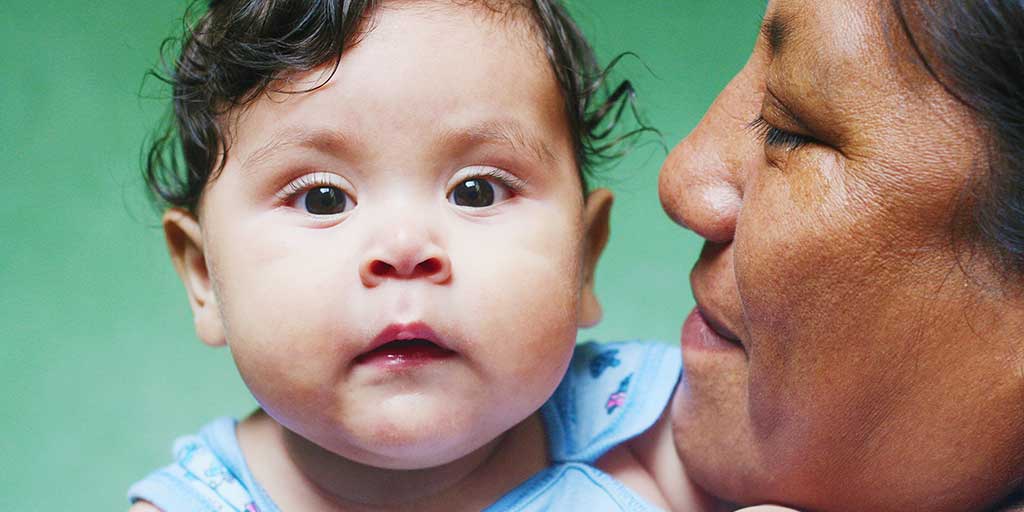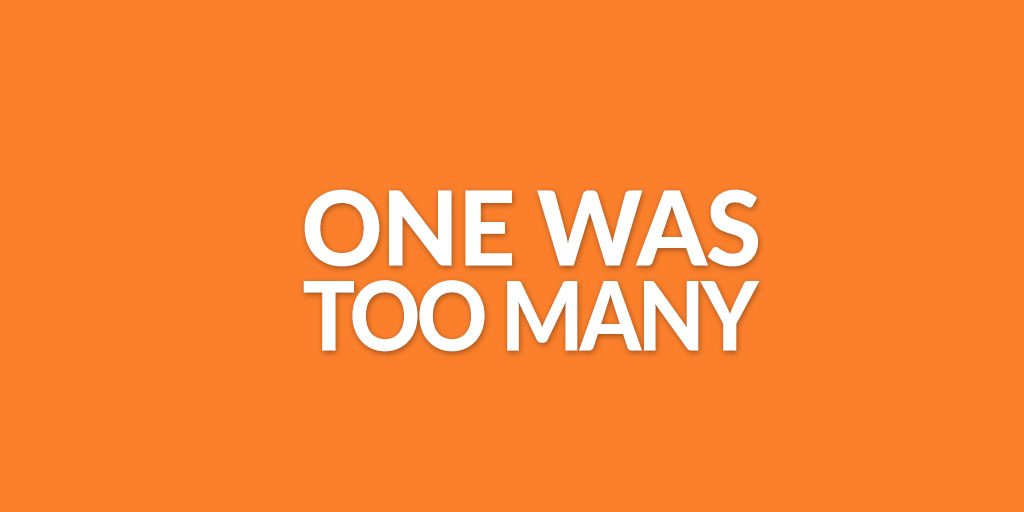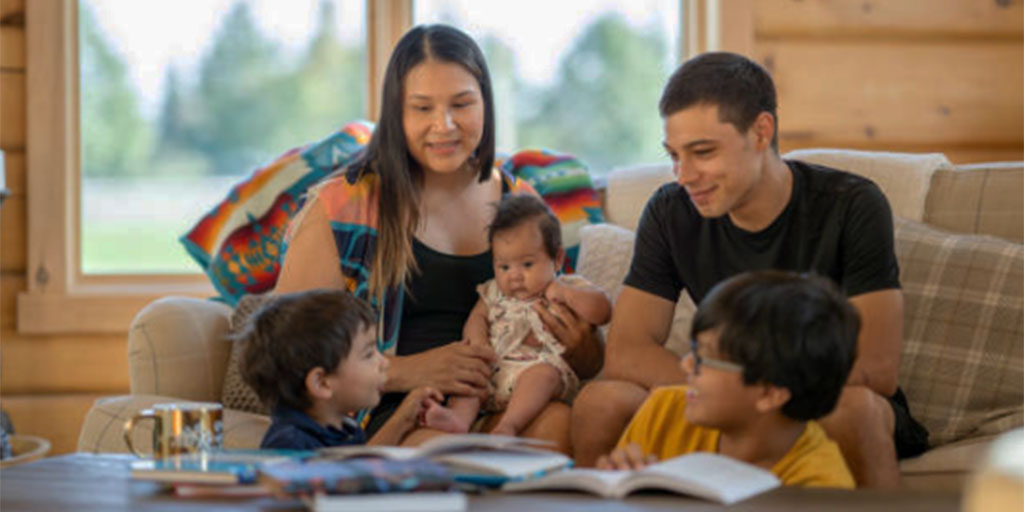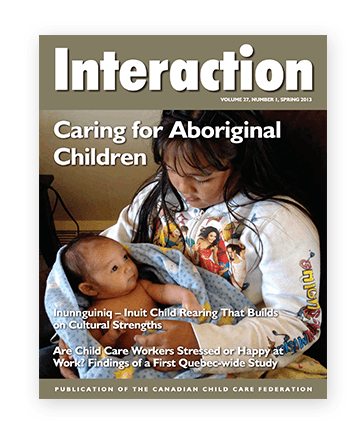Culturally appropriate programs that take into account the cultures, languages, traditions, values and customs of First Nations, Inuit and Métis communities
Indigenous Child Care
For Indigenous children and families, culturally appropriate programs that take into account the cultures, languages, traditions, values and customs of First Nations, Inuit and Métis communities can be crucial in creating a foundation for a child’s cultural identity and sense of worth. Learn more about Indigenous child care.

INDIGENOUS CHILD CARE Articles

Election 2025: Stand on Guard for Child Care
Read about this upcoming 2025 Canadian Federal Election, and how you can stand on guard for child care

Promoting Indigenous Languages in Early Learning and Child Care
Here are a few ideas for how child care practitioners and families can help promote Indigenous languages in early learning and child care

Statement on Kamloops 215
Read the CCCF’s statement regarding the mass grave found on the site of the Kamloops Indian Residential School (Kamloops 215)

Encouraging Indigenous Cultural Identity at Home and in Child Care
Here are a few ideas for how child care practitioners and families can, together and separately, encourage strong cultural identity in Indigenous children
Over the years, CCCF has partnered with many Indigenous organizations to produce high quality resources for Indigenous practitioners.
The following resource sheets were developed with Indigenous Children’s Circle of Early Learning and are available for download in English, French and Inuktitut.
1. Promoting Indigenous Languages in Early Learning and Child Care
Learning their Indigenous language allows children to participate and grow within their culture, and to develop a positive sense of cultural identity. Download the copy here.
2. Problem-Solving Skills – Enhancing Children’s Resilience/ᐊᑲᐅᖏᓕᐅᑕᐅᔪᑦ-ᐋᖅᑭᒃᓱᐃᒋᐊᕈᓰᑦ-ᓱᕈᓰᑦ ᒪᑭᑕᓯᑎᐅᓂᖏᓐᓂᒃ ᐃᑲᔪᕐᓂᖅ
When children have relationships with responsive adults who model a calm, flexible approach to handling life’s challenges, they learn by example how to face their own frustrations and setbacks. Download the copy here.
ᒪᒃᑯᓐᓂᕐᓴᐃᑦ ᓱᕈᓰᑦ ᐃᑲᔪᕐᑕᐅᒋᐊᖃᖅᐳᑦ ᐱᕈᖅᐸᓪᓕᐊᑎᓪᓗᒋᑦ ᐱᒋᐅᕐᓴᕐᓂᒃᑯᑦ ᐊᒻᒪ ᐱᔪᓐᓇᕐᓯᕙᓪᓕᐊᓂᒃᑯᑦ ᐃᑲᔪᕐᓂᖃᕋᔭᕐᒪᑦ ᐋᖅᑭᒃᓱᐃᒐᓱᐊᓕᕐᐸᑕ ᐊᑲᐅᖏᓕᐅᕈᑎᒋᔭᒥᓂᒃ, ᐱᑦᓯᐊᖃᑦᑕᐅᑎᒌᓐᓂᒃᑯᑦ ᐊᒻᒪ ᓴᐃᒻᒪᕆᐊᕐᓂᕐᒧᑦ ᖁᕕᐊᓱᖏᓚᐅᕐᓗᑎᒃ. ᑕᒪᒃᑯᐊ ᐃᓅᓯᕐᒥ ᐱᒋᐅᕐᓴᕐᓂᐅᒻᒪᑕ ᓱᕈᓯᐅᑉ ᐃᒻᒥᓂᒃ ᐅᐱᒍᓱᑉᐸᓪᓕᐊᒍᑎᒋᔪᓐᓇᕐᑕᖏᑦ, ᑲᑦᓱᖓᐃᓕᒍᑎᒋᓗᒋᑦ ᐊᒻᒪ ᐃᑲᔪᕈᓐᓇᐅᑎᖏᓗᒋᑦ ᐃᓅᓯᒃᑯᑦ ᐊᒻᒪ ᐃᒃᐱᓐᓂᐊᓂᒃᑯᑦ. ᓱᕈᓯᑦ ᑭᐅᔭᐅᑦᓯᐊᐸᑐᐊᕋᒥᒃ ᐃᓐᓇᕐᒧᑦ ᑲᒪᒋᔭᐅᑦᓯᐊᑐᐊᕋᒥᒃ ᐅᐃᒪᖏᑦᑐᒃᑯᑦ, ᐱᕕᒃᓴᖃᖅᑎᓯᓂᒃᑯᑦ ᐊᕐᓱᕈᕐᓇᕐᑐᖃᖅᑎᓪᓗᒍ ᐃᓅᓯᕐᒥᒃ, ᐊᒻᒪ ᐃᓕᓴᕐᐸᑦᑐᑦ ᑕᐅᑐᑦᓱᑎᒃ ᐋᖅᑭᒃᓯᐊᕋᓱᐊᕆᐊᖅ ᐊᑲᐅᖏᓕᐅᕈᑎᒋᔭᒥᓂᒃ ᐅᕝᕙᓘᓐᓃᑦ ᓄᖅᑲᖓᐅᑎᒋᔭᖏᓐᓂᑦ. Download the copy here.
3. Families & Practitioners: Working Collaboratively to Support Cultural Identity in Young Children
/ᐃᓚᒌᑦ ᐊᒻᒪ ᐃᑲᔪᕐᑎᐅᔪᑦ: ᐱᓇᓱᐊᖃᑎᒌᒍᑎᖃᓂᖅ ᐃᑲᔪᕐᓯᒐᓱᐊᕐᓂᕐᒧᑦ ᓱᕈᓯᕐᓂᒃ ᑭᓇᐅᓂᕐᒥᓂᒃ ᖃᐅᔨᒪᔭᕆᐊᖃᓂᖏᓐᓄᑦ
Culture is a fundamental building block in creating children’s identity. Download the copy here.
ᐃᓕᖅᑯᓯᖅ ᑐᓐᖓᕕᓪᓚᕆᐊᓘᕗᖅ ᓱᕈᓯᐅᑉ ᑭᓇᐅᓂᖓᓄᑦ ᐱᕈᖅᓴᕐᐸᓪᓕᐊᑎᓪᓗᒍ. ᒪᒃᑯᒻᒪᕆᑦᑎᓪᓗᒋᑦ ᐃᓕᓴᕐᓂᖏᓐᓂ ᐊᒻᒪ ᐃᑲᔪᕐᑕᐅᓂᖏᓐᓂ ᐱᕈᖅᐸᓪᓕᐊᓪᓗᑎᒃ ᐃᓕᓐᓂᐊᕐᐸᓪᓕᐊᒻᒪᑕ ᐊᑐᑦᓯᐊᕐᓗᑎᒃ ᐃᓕᖅᑯᓯᒥᓂᒃ, ᑐᓐᖓᓱᓪᓗᑎᒃ ᐃᑲᔪᕐᑎᒥᓂᑦ ᑐᑭᓯᐊᒍᓐᓇᕐᑐᓂᒃ ᐃᓕᖅᑯᓯᖓᒍᑦ ᐃᓱᒪᒋᔭᖏᓐᓂᒃ ᐊᒻᒪ ᑐᓴᐅᒪᖃᑎᒌᑦᓯᐊᕆᐊᖃᓂᒃᑯᑦ ᐃᓕᖅᑯᓯᖃᖃᑎᒌᖏᑦᑐᑦ ᖃᓄᑐᐃᓐᓇᖅ, ᐊᒻᒪ ᐊᑐᕐᓗᑎᒃ ᐃᓕᓐᓂᐊᕈᑎᑦᓯᐊᕙᐅᒐᔭᕐᑐᓂᒃ ᐱᕈᖅᐸᓪᓕᐊᓂᒃᑯᑦ, ᐃᓕᖅᑯᓯᓄᑦ, ᐅᖃᐅᓯᖓᑎᒍᓪᓗ
Download the copy here.
3. Encouraging Indigenous Cultural Identity at Home and in Child Care
ᑲᔪᖏᖅᓱᐃᓂᖅ ᓄᓇᖃᖅᑳᖅᓯᒪᔪᑦ ᐃᓕᖅᑯᓯᖓᓂᒃ ᑕᑯᒃᓴᐅᑎᑦᓯᒋᐊᖅ ᐊᖏᕐᕋᖏᓐᓂ ᐊᒻᒪ ᐸᐃᕆᓂᒃᑯᑦ
Here are a few ideas for how child care practitioners and families can, together and separately, encourage strong cultural identity in Indigenous children, whether they are participating in an Indigenous or mainstream child care program. Download the copy here.
ᐅᑯᐊ ᑕᕝᕙ ᐊᑖᓃᑦᑐᑦ ᐃᑲᔪᕈᑕᐅᔪᓐᓇᕐᑐᑦ ᐃᓕᓴᐃᕙᑦᑐᓄᑦ ᐊᒻᒪ ᐃᓚᒌᓄᑦ, ᑲᑐᑎᓗᑎᒃ ᐅᕝᕙᓘᓐᓃᑦ ᐃᓄᑑᔾᔨᓂᒃᑯᑦ, ᓴᖅᑭᔮᕐᑎᑦᓯᔪᒃᓴᐅᓂᕐᒧᑦ ᓄᓇᖃᖅᑳᖅᓯᒪᔪᑦ ᓱᕈᓯᖏᓐᓄᑦ ᐃᓕᖅᑯᓯᖓᑕ ᒥᒃᓵᓄᑦ, ᐊᑐᕋᓗᔪᑦ ᓄᓇᖃᖅᑳᖅᓯᒪᔪᑦ ᐅᕝᕙᓘᓐᓂᑦ ᐊᓯᖏᓐᓂᒃ ᑕᒪᒃᑯᓄᖓ ᓱᕈᓯᕐᓄᑦ ᐃᑲᔪᕈᑎᒃᓴᓄᑦ.
Download the copy here.









